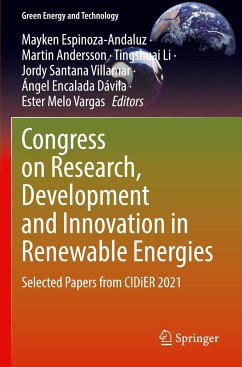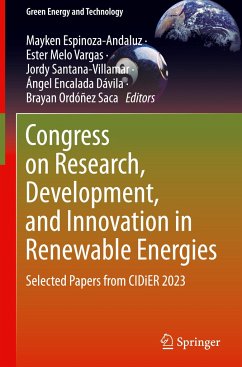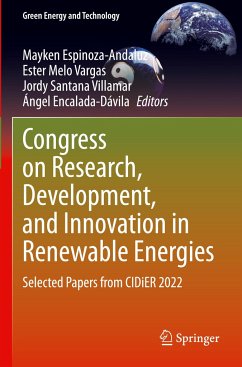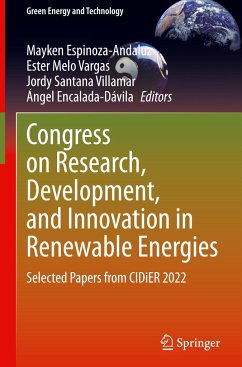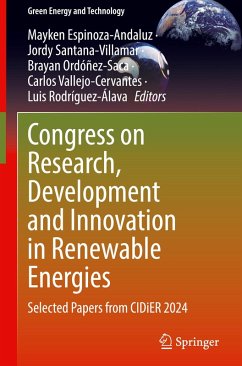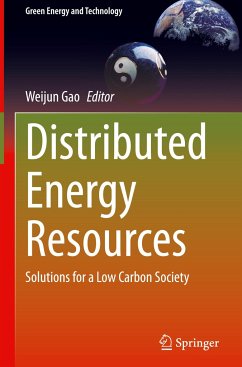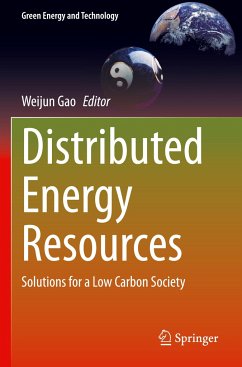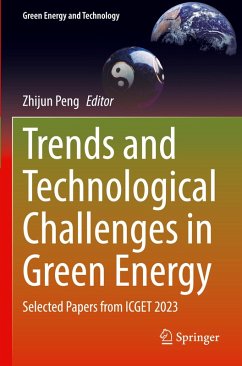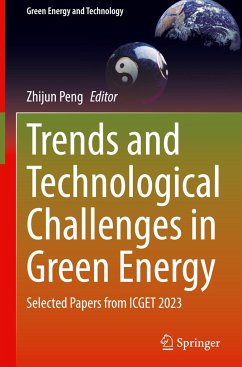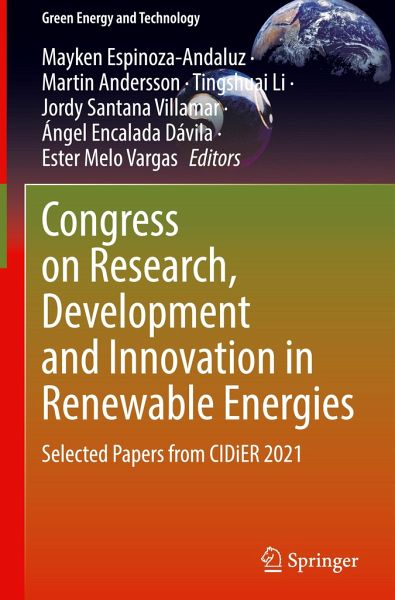
Gebundenes Buch
Congress on Research, Development and Innovation in Renewable Energies
Selected Papers from CIDiER 2021
Herausgegeben: Espinoza-Andaluz, Mayken; Andersson, Martin; Li, Tingshuai; Santana Villamar, Jordy; Encalada Dávila, Ángel; Melo Vargas, Ester
Versandkostenfrei!
Versandfertig in 6-10 Tagen
Weitere Ausgaben:

PAYBACK Punkte
0 °P sammeln!




The 2021 Congress on Research, Development and Innovation in Renewable Energies (CIDiER 2021) aims to promote international collaboration that fosters ideas and dialogue on developing a solution to climate change through research and development that leads to clean energy innovation via renewable energies. These selected papers cover both theoretical and applied research that will strengthen the implementation of renewable energy projects between universities, research centers, and private companies.
Mayken Espinoza-Andaluz, PhD, is a full professor at Escuela Superior Politécnica del Litoral (ESPOL) and co-supervisor of PhD students in Heat Transfer and Energy Systems at Lund University. He earned his PhD in Heat Transfer from the Department of Energy Sciences at Lund University. His areas of research include renewable energy, fuel cells, proton-exchange membrane fuel cells (PEMFC), solid oxide fuel cells (SOFC), physical and chemical phenomena, energy efficiency, Lattice Boltzmann methods (LBM), and computational modeling. He is a reviewer for a number of international journals, including the International Journal of Energy Research, International Journal of Hydrogen Energy, and Computers and Mathematics with Applications. Martin Andersson, PhD, is an associate professor at Lund University. He earned his doctoral degree from the Division of Heat Transfer, Department of Energy Sciences at Lund University. Dr. Andersson was awarded the title of Docent in 2014, and in 2015 he was granted a Marie Curie Fellowship, one of Europe's most competitive and prestigious awards to foster interdisciplinary research and international collaborations. His primary areas of research include analysis of heat and mass transfer and other transport phenomena in solid oxide fuel cells (SOFC) and polymer electrolyte fuel cells (PEFC). His current research interests are focused on a comprehensive understanding of chemical reactions and nano-/micro-structured porous material effects on various transport processes in various components of fuel cell systems. He has been a reviewer for a number of international journals, including the International Journal of Hydrogen Energy, International Journal of Energy Research, Energy and Fuels, Journal of Power Sources, and Journal of Porous Media. Tingshuai Li, PhD, is a professor at the University of Electronic Science and Technology of China (UESTC). He earned his PhD degree in materials chemistry and physics from Ningbo Institute of Materials Technology and Engineering, Chinese Academy of Sciences. Dr. Li carried out postdoctoral research at Nanyang Technological University and the University of South Carolina. He has published numerous scientific papers, applied for more than 10 patents, participated in the writing of two monographs, and presided over the Natural Science Foundation of China and key research and development projects in Sichuan Province. His primary areas of research include materials design for fuel cells and electrochemical synthesis of various fuels. He has been a reviewer for the International Journal of Hydrogen Energy, Journal of Materials Chemistry A, and ACS Applied Materials & Interfaces. Jordy Santana-Villamar received his bachelor's degree in mechanical engineering from Escuela Superior Politécnica del Litoral (ESPOL)in 2020, obtaining a diploma of distinction in research. He was a teaching assistant at the early stage of his bachelor degree on subjects such as calculus, electromagnetics physics, and statistics. He then obtained a position as an assistant researcher during his last four semesters. Currently, he is a junior researcher at the Center of Renewable and Alternative Energy at the Escuela Superior Politécnica del Litoral (ESPOL). His area of research is electrochemical tests to evaluate the performance in fuel cells and redox flow batteries applying EIS technique, sweep current, linear, and circular sweep voltammetry; expanded graphite-resin composite materials development with secondary fillers for bipolar plates; and modeling on transport phenomena. In addition, he has published several scientific papers in leading journals including the International Journal of Hydrogen Energy, Journal of Electrochemical Society, and Energies. He has also participated incongresses, international conferences, and meetings to spread his research work. He recently worked as an organizer of the Congress of Research, Development, and Innovation in Renewable Energies (CIDiER), Guayaquil, Ecuador. Ángel Encalada-Dávila received his bachelor's degree in Mechatronics Engineering in 2021 from Escuela Superior Politécnica del Litoral (ESPOL). He is currently working as a data scientist for an international data analytics company. He also has solid experience in the software industry for ATMs. Furthermore, he collaborates as a data scientist at the Control, Modeling, Identification, and Applications Research Group (CoDAlab) at the Universitat Politècnica de Catalunya (UPC), Barcelona, Spain. His research interests include structural health monitoring (SHM) and fault prognosis applied to wind turbines and computer modeling applied to fuel cells. In addition, Mr. Encalada is author and co-author of several scientific articles that have been published in journals including Sensors, Energies, and Processes. He recently worked as an organizer of the Congress of Research, Development, and Innovation in Renewable Energies (CIDiER), Guayaquil, Ecuador. Ester Melo received her bachelor's degree in Audit and Management Control in 2021 from the Escuela Superior Politécnica del Litoral (ESPOL), obtaining an honor diploma and an award for her thesis project related to the management of medical supplies in Ecuador during the Covid-19 pandemic. From 2019 to the present, she has served as a research assistant at the same institution. Her interest in research, technology and gender inclusion in STEM have motivated her to participate in different technological innovation competitions, as well as in STEM projects sponsored by the United States Embassy in Ecuador. This experience gave her the opportunity to do an internship in project engineering at Huawei Technologies (Guayaquil, Ecuador) in 2020. Her research interests include data analysis and fault detection applied to fuel cells and quality analysis and lean manufacturing applied to productivity management. In addition, Ms. Melo is the author and co-author of scientific articles that have been presented at congresses, conferences, and scientific dissemination meetings.
Produktdetails
- Green Energy and Technology
- Verlag: Springer / Springer International Publishing / Springer, Berlin
- Artikelnr. des Verlages: 978-3-030-97861-7
- 1st edition 2022
- Seitenzahl: 204
- Erscheinungstermin: 3. Juni 2022
- Englisch
- Abmessung: 241mm x 160mm x 17mm
- Gewicht: 477g
- ISBN-13: 9783030978617
- ISBN-10: 3030978613
- Artikelnr.: 63382377
Herstellerkennzeichnung
Springer-Verlag GmbH
Tiergartenstr. 17
69121 Heidelberg
ProductSafety@springernature.com
Für dieses Produkt wurde noch keine Bewertung abgegeben. Wir würden uns sehr freuen, wenn du die erste Bewertung schreibst!
Eine Bewertung schreiben
Eine Bewertung schreiben
Andere Kunden interessierten sich für


